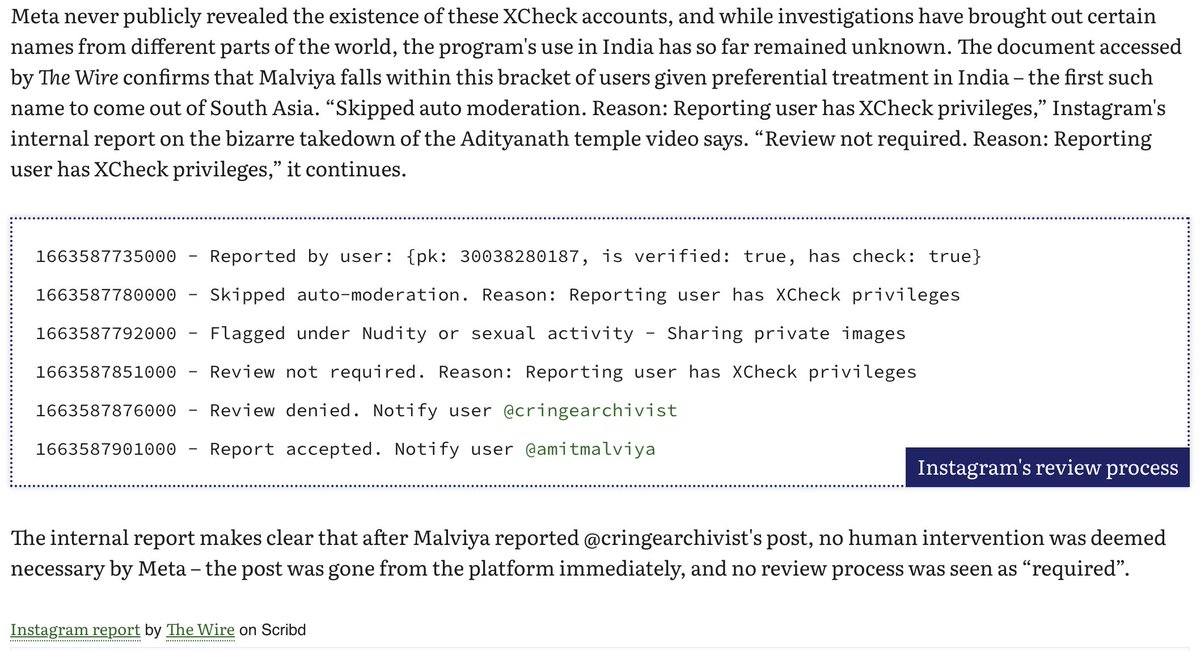
#EveningReads
If you’ve been surfing on @Twitter in the past 24 hrs, you know that it has been quite a day for @Meta. From takedowns of @\cringearchivist content, Meta’s controversial XCheck programme, to “censor privileges” for BJP’s Amit Malviya, we cover it all in this 🧵.1/10
If you’ve been surfing on @Twitter in the past 24 hrs, you know that it has been quite a day for @Meta. From takedowns of @\cringearchivist content, Meta’s controversial XCheck programme, to “censor privileges” for BJP’s Amit Malviya, we cover it all in this 🧵.1/10
Let’s recap:
Instagram took down a video minutes after it was posted by the account, 'Superhumans of Cringetopia'. The grounds?: It violated Instagram's nudity & sexual content' guidelines.
thewire.in/rights/instagr…
2/10
Instagram took down a video minutes after it was posted by the account, 'Superhumans of Cringetopia'. The grounds?: It violated Instagram's nudity & sexual content' guidelines.
thewire.in/rights/instagr…
2/10
.@thewire_in later learnt, “from a well-placed source at Meta” that it was taken down only because it was reported by @amitmalviya, who also happens to be the president of the BJP's IT Cell.
thewire.in/tech/amit-malv…
3/10
thewire.in/tech/amit-malv…
3/10
No questions asked policy for Malviya?
Per the internal Instagram report accessed by The Wire, any post reported by Malviya, doesn't require auto-moderation/ review due to XCheck privileges, & is thus immediately taken down. All (705) posts reported by him have been removed.4/10
Per the internal Instagram report accessed by The Wire, any post reported by Malviya, doesn't require auto-moderation/ review due to XCheck privileges, & is thus immediately taken down. All (705) posts reported by him have been removed.4/10

.@JeffHorwitz was the first to report on the ‘XCheck’ for the Wall Street Journal in 2021:
wsj.com/articles/faceb…
Meta's controversial 'XCheck' program exempts an identified set of high-profile users from enforcement action.
5/10
wsj.com/articles/faceb…
Meta's controversial 'XCheck' program exempts an identified set of high-profile users from enforcement action.
5/10
The Wire reports that this program not only allows certain influential people to post “rule-violating” content, but also restricts the rights of other users, by allowing their posts to be taken down even without justifiable cause. This new revelation is a cause of concern. 6/10
Hold on to your seats, it gets better (well, worse for Meta)!
An internal email sent by Meta’s policy communications director @andymstone was leaked & its screenshot published by The Wire today. He asks, "how the hell (the doc) got leaked?".
thewire.in/tech/meta-xche…
7/10
An internal email sent by Meta’s policy communications director @andymstone was leaked & its screenshot published by The Wire today. He asks, "how the hell (the doc) got leaked?".
thewire.in/tech/meta-xche…
7/10
Moreover, Stone is seen asking for the document’s “activity report” for the past month. He also instructed his team to put the author of the initial article, @jahnavi_sen, & the Founding Editor, @svaradarajan, on their “watchlist”. 8/10 

The tone in the mail is in stark contrast to Stone’s public response on Twitter where he refutes the allegations made against XCheck. He even claimed that the underlying document accessed by The Wire is “fabricated”.
9/10
https://twitter.com/andymstone/status/1579645448276840448?s=20&t=5nb1Yu37Ce84MSMA8oTlqw
9/10
The story doesn’t end here, and neither does the list of revelations made in the latest article by The Wire. What is apparent & urgent is the need for transparency & accountability with respect to the platform’s content moderation practises. 10/10
• • •
Missing some Tweet in this thread? You can try to
force a refresh










